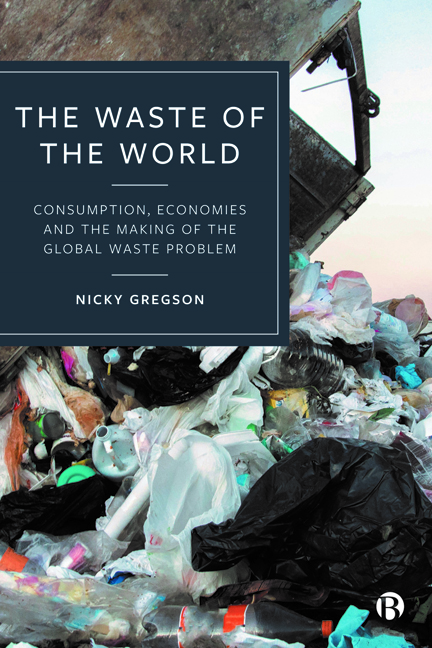Book contents
- Frontmatter
- Contents
- Acknowledgements
- Preface
- 1 The Global Waste Problem and How to Think about It: Or, how to understand the ‘too much waste’ problem
- 2 Discard, Social Order and Social Life: Or, discard is foundational to understanding waste
- 3 Consumption, Consumer Practices and Consumer Discard: Or, how consumer discard relates to economies
- 4 Conduits, Value Regimes and Valuation: Or, following consumers’ discarded things
- 5 Recommodifying Discard: Or, the challenges of turning discard into an economic good
- 6 Waste, Money and Finance: Or, how turning discard into waste turns waste into an energy resource and an asset
- 7 Future Directions: Or, rewiring waste through the three Ds (decarbonization, digital and discard)
- Notes
- References
- Index
1 - The Global Waste Problem and How to Think about It: Or, how to understand the ‘too much waste’ problem
Published online by Cambridge University Press: 18 January 2024
- Frontmatter
- Contents
- Acknowledgements
- Preface
- 1 The Global Waste Problem and How to Think about It: Or, how to understand the ‘too much waste’ problem
- 2 Discard, Social Order and Social Life: Or, discard is foundational to understanding waste
- 3 Consumption, Consumer Practices and Consumer Discard: Or, how consumer discard relates to economies
- 4 Conduits, Value Regimes and Valuation: Or, following consumers’ discarded things
- 5 Recommodifying Discard: Or, the challenges of turning discard into an economic good
- 6 Waste, Money and Finance: Or, how turning discard into waste turns waste into an energy resource and an asset
- 7 Future Directions: Or, rewiring waste through the three Ds (decarbonization, digital and discard)
- Notes
- References
- Index
Summary
That the world has a waste problem is incontrovertible. Equally obvious is that this problem connects to global levels of consumption. What is debatable, however, is how those connections are drawn and understood. The arguments that are made and then developed in this book are born of the contention that the ways these connections have been drawn are fundamentally flawed. More than that, because they are flawed, the interventions that they suggest are awry. While they may be motivated by the very best of intentions, many of the interventions designed to address the problem of too much waste actually have the opposite effect: they work as incentives to generate more of the stuff. Even worse, many of the solutions put in place to manage waste demand that more waste be produced. This, I would argue, is down to how we understand and think about waste, its relation to consumption, and the relation of both to economic activity.
Before I begin to open this up, let's take a look at the scale of the waste problem. Some of the numbers here are mind-boggling. They evidence that the world most definitely has a waste problem. Take construction and demolition wastes, for example. These wastes are closely related to rates of economic growth. Booming economies are characterized by a huge expansion in construction activity, not just in relation to residential uses but also industrial premises and corporate facilities. Construction and demolition wastes are sizeable contributors to the total wastes in every country. An estimated 3 billion-plus tonnes of construction and demolition wastes are generated annually globally, much of it concrete, which ends up mostly landfilled. China alone accounts for over 1 billion tonnes of these wastes. Undoubtedly, construction and demolition wastes are a huge part of the global waste problem, but, like many of the wastes that result from industry, they are niche; they only trouble those who work in the construction and demolition industries and regulators.
It is a similar story with a very different type of waste: radioactive wastes. These wastes are an unavoidable effect of nuclear power generation and are an inevitable part of a future powered by non-fossil fuel-derived energy.
- Type
- Chapter
- Information
- The Waste of the WorldConsumption, Economies and the Making of the Global Waste Problem, pp. 1 - 30Publisher: Bristol University PressPrint publication year: 2023



